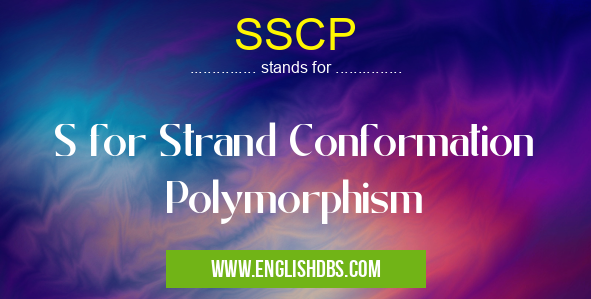What does SSCP mean in UNCLASSIFIED
SSCP stands for Strand Conformation Polymorphism. It is a technique used to detect mutations in DNA sequences. The technique is based on the principle that single-stranded DNA molecules of different sequences will adopt different conformations or shapes. These different conformations can be separated by electrophoresis, a technique that separates molecules based on their size and charge.

SSCP meaning in Unclassified in Miscellaneous
SSCP mostly used in an acronym Unclassified in Category Miscellaneous that means S for Strand Conformation Polymorphism
Shorthand: SSCP,
Full Form: S for Strand Conformation Polymorphism
For more information of "S for Strand Conformation Polymorphism", see the section below.
How SSCP Works
The SSCP technique involves the following steps:
- PCR amplification: The DNA region of interest is amplified using the polymerase chain reaction (PCR).
- Denaturation: The PCR products are denatured, which separates the two strands of DNA.
- Renaturation: The single-stranded DNA molecules are allowed to renature, forming double-stranded molecules. However, due to sequence variations, some of these molecules will not perfectly match and will form mismatched duplexes.
- Electrophoresis: The renatured DNA molecules are separated by electrophoresis. Molecules with different conformations will migrate differently through the gel.
- Visualization: The separated DNA fragments are visualized using a fluorescent dye or silver staining.
Applications of SSCP
SSCP is a versatile technique that can be used for various applications, including:
- Mutation detection: SSCP can detect mutations as small as a single nucleotide change.
- Genetic screening: SSCP can be used to screen for genetic diseases in individuals and families.
- Forensic analysis: SSCP can be used to identify individuals from DNA samples.
- DNA fingerprinting: SSCP can be used to create DNA fingerprints, which can be used for identification and paternity testing.
Advantages of SSCP
SSCP offers several advantages over other mutation detection techniques:
- Simplicity: SSCP is a relatively simple and inexpensive technique.
- Sensitivity: SSCP can detect even small mutations.
- Versatility: SSCP can be used to analyze a wide range of DNA sequences.
Disadvantages of SSCP
SSCP also has some disadvantages:
- Labor-intensive: SSCP can be labor-intensive, especially when analyzing large numbers of samples.
- Sequence dependence: The effectiveness of SSCP can depend on the sequence of the DNA region being analyzed.
- False positives: SSCP can sometimes produce false positives due to non-specific interactions between DNA molecules.
Essential Questions and Answers on S for Strand Conformation Polymorphism in "MISCELLANEOUS»UNFILED"
What is Strand Conformation Polymorphism (SSCP)?
SSCP is a technique used to detect single-nucleotide polymorphisms (SNPs) in DNA sequences. It involves heating DNA samples to separate the strands and then cooling them slowly to allow them to reanneal. Under certain conditions, SNPs can cause the strands to form different conformations, which can be detected using gel electrophoresis.
What are the advantages of using SSCP to detect SNPs?
SSCP is a relatively simple and inexpensive method for detecting SNPs. It can be used to analyze multiple samples simultaneously and does not require expensive equipment. Additionally, SSCP can detect SNPs in both coding and non-coding regions of DNA.
What are the limitations of using SSCP to detect SNPs?
SSCP can only detect SNPs that cause a change in the conformation of the DNA strands. It is not as sensitive as some other methods for detecting SNPs, such as DNA sequencing, and may not be able to detect all SNPs in a given sample.
What are some applications of SSCP?
SSCP is used in a variety of applications, including:
- Identifying genetic variants associated with diseases
- Studying the evolution of DNA sequences
- Forensic analysis
- DNA fingerprinting
Final Words: SSCP is a valuable technique for detecting mutations in DNA sequences. It is a simple, sensitive, and versatile method that can be used for a wide range of applications. However, it is important to be aware of its limitations, such as its labor-intensive nature and sequence dependence.
SSCP also stands for: |
|
| All stands for SSCP |
